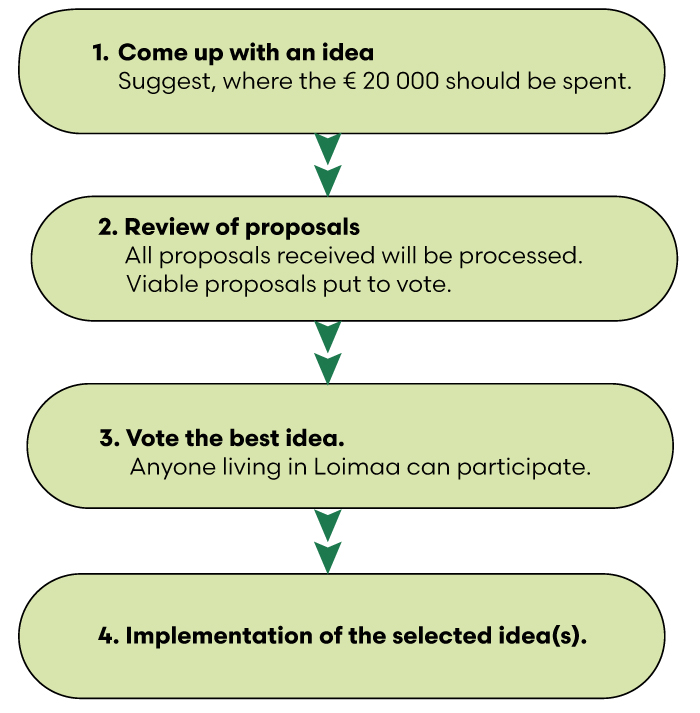Participatory budgeting 2025
When adopting the budget for 2025, the Loimaa city council approved an allocation of 20 000 euros for participatory budgeting to promote the well-being of residents. In 2025, the theme will be Loimaa families with children.
Participatory budgeting is a process of collecting ideas from local residents on how to implement the budget. Participatory budgeting allows people to define, discuss and prioritise public spending. At the same time, it gives people the power to make real decisions and decide how money is spent.
The participatory budgeting process

- In April, the opportunity will be opened to all Loimaa residents to come up with ideas for the use of the budget. Suggest an idea that you think is appropriate (link to survey, in Finnish only) between 2 and 27 April.
- In May, all proposals received will be reviewed and those that are viable will be moved to the ballot. The aim is to launch a vote on the selected proposals in May, when the best ideas on the list will be put to the vote.
- In June, the idea(s) to be implemented will be selected. Implementation, as a rule, during 2025.
This page will be updated with the current state of play on the participatory budgeting process.
Involving residents in the brainstorming
Participatory budgeting combines economy and democracy by involving citizens in deciding where financial resources are spent. The money is not distributed like grants, but all residents can propose and vote on the selected proposals to decide where the €20,000 set aside will be spent.
As a condition for participatory budgeting, the idea proposed must be new and the project must not have received funding in previous years. Within a budget of €20,000, one or more ideas may be implemented, depending on the outcome of the vote.
- The use must be such that it can (as a rule) be implemented during 2025. Ideas can be related to events, improving safety in the local area, leisure opportunities or even increasing community and amenity. Investments are not covered by participatory budgeting.
- The implementation of the idea is a one-off cost and should not result in significant recurrent staff or other operating costs for the city in subsequent years.
- The idea can be implemented by the proposer or by the municipality; if the proposer is a private person or an unregistered group of private persons and the proposer wants to implement the idea, the grant can only be paid afterwards against receipts.
- If necessary, an idea can be combined with a similar idea or ideas to form a larger whole before it goes to a vote.
- A panel of experts from the city will evaluate the proposals and, if necessary, contact the proposer regarding the content and implementation of the idea. The selected proposals will be put to a vote.
- The principle is that the idea that receives the most votes and then as many ideas as can be implemented with the budget is allocated.
- The Council for the Elderly and Disabled makes a proposal for the beneficiary(ies) based on the result of the vote and the Finance Director makes the formal decision.
